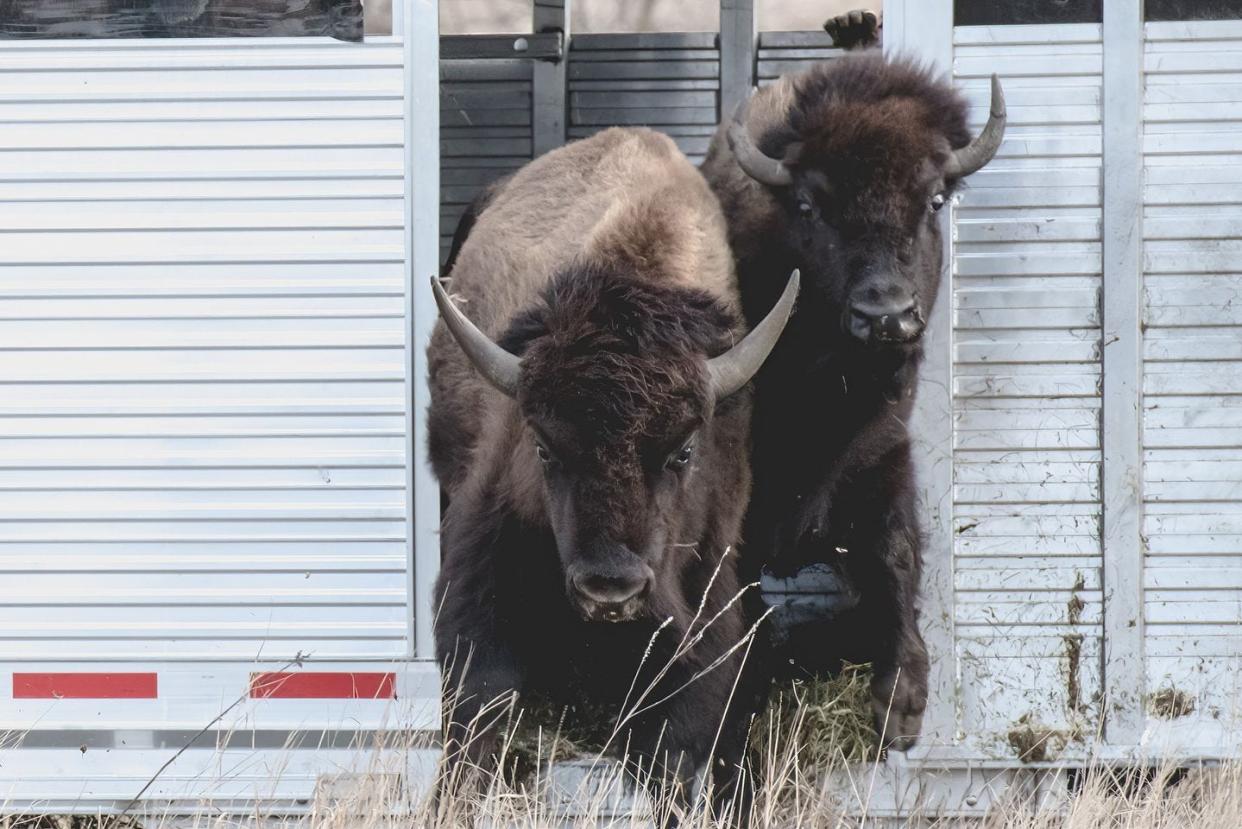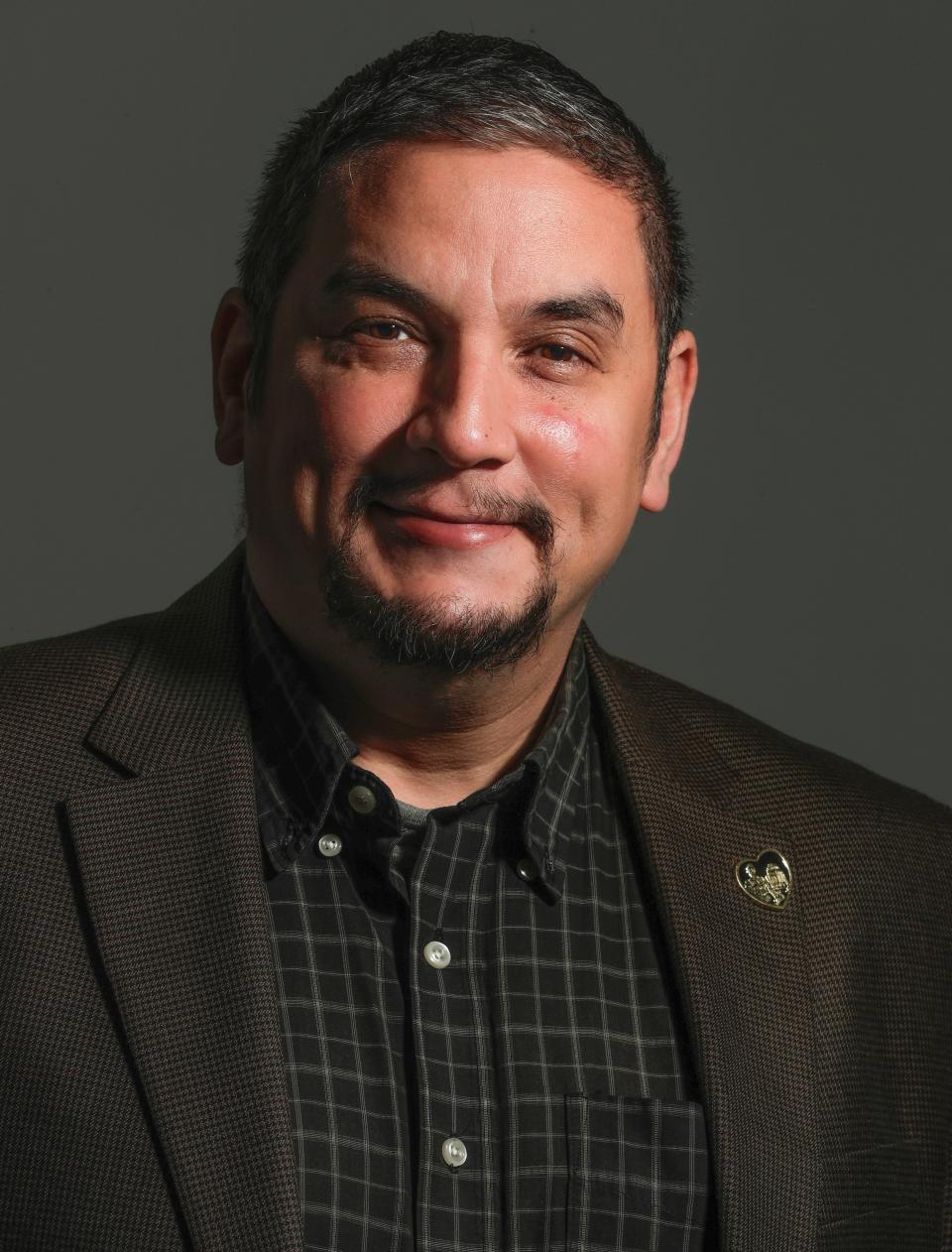How tribes in Wisconsin are reintroducing the bison with an eye toward food sovereignty and cultural revitalization

MIDDLE VILLAGE - More bison are returning to Wisconsin to be managed by tribal nations.
The Menominee Nation this winter received 10 bison through a partnership among the South Dakota-based Intertribal Buffalo Council, The Nature Conservancy in Illinois and the U.S. Department of Agriculture.
“Right now, the whole idea for us is to reintroduce ourselves to the bison,” said Guy Reiter, whose Menominee name is Anahkwet and is the executive director of the Menominee community organization Menīkānaehkem, Inc. “They played a role at one time in our culture.”
The bison currently have about 66 acres to roam between pastures on the Menominee reservation, Anahkwet said. Much of that land had once been a non-tribal farm that used chemicals. Now under tribal management, a restoration process that includes the Indigenous technique of prescribed burning is bringing back native grass for the bison to feed on.
One future goal is to harvest bison meat for tribal citizens as a healthy alternative to Western beef, Anahkwet said.
For now, though, the initial goal is to grow the herd and observe how the bison acclimate to the natural grass.
Bison and prairie grass are thought to be mutually beneficial. The grass feeds the bison while the animals trample the grass, which stimulates new growth. The bison also leave behind manure, which serves as fertilizer.
The Forest County Potawatomi Community also received 10 bison through the partnership to add to that tribe’s herd. The Potawatomi farm currently provides about 2,000 pounds of grass-fed bison beef annually to tribal citizens.

Sign up for the First Nations Wisconsin newsletter Click here to get all of our Indigenous news coverage right in your inbox
Grass-fed beef is far healthier than meat from grain-fed livestock, experts have said. It contains more omega-3 fatty acids and also may have other heart-health benefits by having more antioxidant vitamins, such as vitamin E, less total fat and a certain type of fat that helps reduce the risk of heart disease and cancer, according to the Mayo Clinic.
Heart disease and cancer both caused 20% of Indigenous deaths in Wisconsin, according to data from the Wisconsin Department of Health Services.
Indigenous people in Wisconsin are also more than three times more likely to die from diabetes than the white population, according to the state agency.
This health crisis arose as a result of Indigenous people being forced onto reservations by the U.S., typically in areas poor for farming, which led to poor diets for generations of people.
Many tribal nations once relied on bison for sustenance before white colonizers nearly caused the bison’s extinction.
More: Oneida Farmers Market receives federal grant to expand
Tens of millions of bison once roamed the continent, but overhunting for food and hides, as well as for sport to deprive Indigenous tribes of this resource had reduced the population to just a few hundred during the span of a few decades in the 19th century.
About 1,500 bison are being transported to tribal nations across the country through the partnership’s Surplus Buffalo Program.
“The significance of buffalo extends beyond their physical presence on the land,” said Troy Heinert, Sicangu Lakota, executive director of the Intertribal Buffalo Council. “They represent a positive force toward spiritual and cultural revitalization, ecological restoration and conservation, food sovereignty, health, economic development and much more as each buffalo is brought back home.”
The Intertribal Buffalo Council formed in 1992 and has helped bring home more than 20,000 bison to Indigenous communities since its founding.
Frank Vaisvilas is a Report for America corps member who covers Native American issues in Wisconsin based at the Green Bay Press-Gazette. Contact him at fvaisvilas@gannett.com or 815-260-2262. Follow him on Twitter at @vaisvilas_frank.You can directly support his work with a tax-deductible donation online at GreenBayPressGazette.com/RFA or by check made out to The GroundTruth Project with subject line Report for America Green Bay Press Gazette Campaign. Address: The GroundTruth Project, Lockbox Services, 9450 SW Gemini Drive, PMB 46837, Beaverton, Oregon 97008-7105.
This article originally appeared on Green Bay Press-Gazette: Bison in Wisconsin managed by tribal nations for food, cultural value

